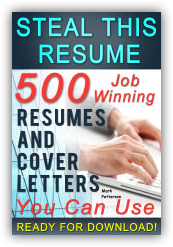So just what is a Resume? A list of your past jobs? No. A catalog of your skills and abilities? No. A sheet of thick cream-colored paper covered with fancy fonts and bullet points? Of course not!
Quite simply a job-winning Resume is a sales tool.
So how do you sell yourself? Good question, and we’ll cover that in Resume Secrets.
But first, here are a few basic guidelines: Spelling counts. Use a spell-checker. Then have someone smart proof-read your work. Sometimes errors happen and that’s understandable — but don’t repeat errors over and over. Errors reflect on you in a negative way. If your Resume looks sloppy guess who gets the blame?
Next, don’t lie. Don’t make stuff up. Don’t stretch the truth. Really. It’s not worth the risk. Stick with the facts and let the facts speak for you (more on that in Resume Secrets).
Should you include hobbies? Only if they’re relevant to the job. Let’s say you sell auto parts and race cars on the weekend. Great!
Should you include community service? Yes, if it’s important to show that you have good people skills or networking abilities. Yes, if you’re just starting out and want to present yourself as well-rounded and outgoing.
What about other volunteer work? Yes, if it’s relevant. Many people have gained valuable work experience by first volunteering in fields they’d like to enter as careers. Even if you didn’t get paid you still gained excellent experience.
What about religious or church affiliation? Not unless it’s relevant to the job. Same with gender, race, height, weight and so forth. But you knew that already, didn’t you?
College degrees or educational certificates are important to note, of course. How about college or technical school if you didn’t graduate? Yes, because it shows you want to learn and improve your abilities. Include classes that might prove valuable to a prospective employer. Underwater basket weaving probably won’t impress anyone, though.
How about GPA (Grade Point Average)? If it’s 4.0 great! If it’s not then no one will notice if you don’t include it.
Should you list activities in college? Only if you recently graduated or they’re extremely relevant.
So how far back should you go with employment history? Twenty to thirty years is a general rule of thumb. You don’t want to appear older than dinosaurs, but then again if you’re a seasoned pro with lots of relevant experience make it known.
What about breaks in employment? That’s a potential red light to employers and you don’t want them wondering if you’ve been in jail or the nut house. Most breaks from employment are easily explained. Here are some examples: Raising Family. Traveling. Pursuing Education. Sailing Around the World. Pursuing New Job. Caring For Parents. Homemaker.
If you’ve actually been in jail or the nut house don’t lie, write Will Discuss Personally.
How long should your Resume be? One or two pages is the general rule of thumb. Shorter is usually better.
Remember, a job-winning Resume isn’t just a list of previous job titles and duties.
Use a common and readable font. Fancy and artsy has its place, but only if you’re in a fancy artsy field.
No need for heavy-weight or ivory-colored paper, either. It’s what is on the page that counts.
Lastly, once you’ve written your job-winning Resume update it at least once a year. That way if the perfect job opportunity suddenly appears you’ll be set to go.
Now let’s move on to Resume Secrets.
